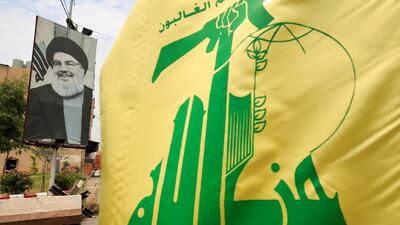This week, Hezbollah, the Iran-backed militant party in Lebanon, was dealt a blow in the international arena from two unlikely sources. Guatemala and Estonia took formal steps to designate the party a terrorist organisation, denying it and its members access to their borders and economies. Estonia took the added step of imposing sanctions.
Hezbollah has already been designated as a terrorist organisation by a host of nations, including the US, Britain, Germany and Saudi Arabia and the UAE, among others. That recognition of the party’s vast network of international criminal activities now extends to Central America and the Baltic Sea.
Over the past four decades of Lebanon's history, Hezbollah has used its armed militia as a bludgeon with which to develop an obstructive political presence in Parliament and other areas of government. Its fighters are also in neighbouring Syria, where they have propped up the regime of Bashar Al Assad for years. There are reports of Hezbollah operatives training the Houthi rebels of Yemen, training militiamen in Iraq, and providing support to Hamas, the extremist group that rules the Gaza Strip. Hezbollah's regional presence is impossible to ignore.
But not enough is said about Hezbollah’s global reach. In recent years, its operatives have been caught with large amounts of ammonium nitrate all over Europe. The explosive chemical, used primarily as a fertiliser, triggered a deadly blast in Beirut on August 4.
In 2015, British authorities seized three tonnes of ammonium nitrate stored by Hezbollah operatives in London, and more than eight tonnes of the substance was found to have been stored by the group in Cyprus. Prosecutors in Argentina have also found that Hezbollah, and its patron the Iranian government, were behind a 1994 suicide bombing at a Jewish Community Centre in Buenos Aires that killed 85 people.
As Tehran continues to feel the economic pinch from renewed US sanctions, Hezbollah has diversified its revenue sources through money laundering activities often linked to drug cartels. It is particularly active in the tri-border area between Argentina, Paraguay and Brazil, where it is involved in organised crime.
By its very name, Hezbollah, which means “Party of God” in Arabic, claims to serve divine justice – but could not be further from any such thing. It portrays itself as a resistance movement and a political party that represents the Lebanese people. But no legitimate political party maintains its own rocket arsenal and an army of fighters involved in brutal wars throughout the Middle East, in addition to criminal networks that span parts of Latin America and Africa. Hezbollah has all of this, and yet its officials insist on being treated as legitimate politicians.
Estonia and Guatemala are the latest countries to have taken steps to protect their people from the group. More countries would do well to follow that example, and designate Hezbollah as a terrorist entity. Its leadership have done enough damage to Middle Eastern nations, including their native Lebanon. Due largely to Hezbollah’s actions, the Lebanese people have been increasingly isolated from their allies abroad even as they are locked in an economic crisis. Until Hezbollah’s influence is effectively curtailed, their plight will persist.


